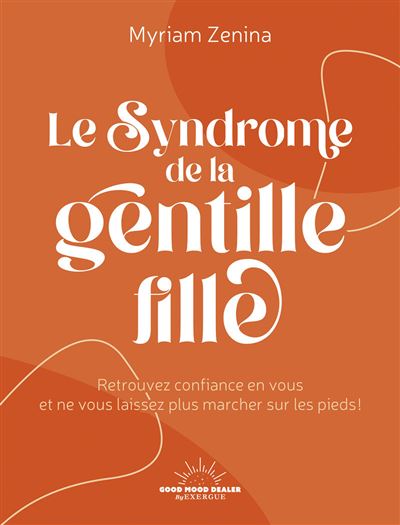What if kindness became a trap? In Gentil girl syndrome (Ed. Good Mood Dealer), Myriam Zenina highlights a reality often killed: that of brilliant, committed, competent women, but prisoners of their need to please, to be loved, validated. Through her gaze as a self -esteem and her personal experience, she questions our relationship to self -esteem, assertiveness and fear of rejection. A deep conversation, which invites us to reconcile ourselves with ourselves.
You approach the idea that many women are looking for validation outside. Why do you think it is so anchored?
Myriam Zenina: Indeed, this need is deeply rooted in us, because it is part of our survival instinct as a human being. In the past, we needed the group to survive. In the Maslow pyramid, the third need is that of belonging. We need to be part of a group, to feel seen and validated by him.
Isolation is, in a way, a little death for humans. Seeking validation outside is trying to fill a need for love. This need is more or less marked according to our education, our culture, our injuries. In reality, we almost all need external recognition. But when it becomes excessive, it can poison us.
You evoke a frequent dissociation between the body and emotions in women. How does it manifest itself, and how to remedy it?
Myriam Zenina: Yes, the “nice girls”, especially when they are in survival mode, tend to take greatness on them. But to take it on yourself is indirectly bringing a weight to your body. They do not realize that their emotions, if they are not welcomed, digested, “processed”, can eventually transform into diseases, more or less serious.
But at the beginning, it is insidious: it starts with an overwhelming mental charge, chronic fatigue, repeated colds … Then it intensifies, until it becomes more painful, more serious. They live a deep disalioning. The body cashes instead of a heart or a spirit that is forced to silence. He absorbs the emotions that we refuse to look at, under the effect of an intense stress that the nice girls make weighing, in spite of themselves, on their organism.
To remedy it, it is essential to fully feel each emotion, and especially to put words on what we live. From the moment we verbalize, the emotional load begins to dissolve. Each manages their emotions in its own way. What I recommend to women I accompany is to observe what they do in their day that allows them to experience beautiful emotions. Conversely, when a day is heavy, when negative emotions emerge, I suggest them ask: What started that? The answers are often real nuggets. And it is generally the same triggers that come back. You must then treat the problem at the root, and do it without delay.
In a professional context, how can kind girl syndrome slow down a woman’s career?
Myriam Zenina: The nice girl’s syndrome is a silent career slower. For what ? Because we think we are not enough. And that has immense consequences: we do not know how to highlight our work, we dare not ask for an increase or promotion. The kind girl thinks that she is lucky to have this position, she never reverses the dynamics by saying that her business also has the chance to have her as a collaborator.
When the nice girl’s syndrome is strongly anchored, and the person evolves In a so-called “toxic” professional environment, the risk of moral harassment or burn-out increases considerably. This is what one of my coaches tells in his testimony, which you can find in the book.
The problem, when you are caught in the nice girl’s syndrome, is that you believe that kindness will open doors to us. In reality, you often end up building your own inner prison. A paradox is then born in the minds of those who suffer from it: “I was taught, since childhood, that kindness was a noble value… But today, as an adult, it is this same kindness that harms me and makes me suffer.”
This discrepancy creates a deep disalioning. And often, we fold up on ourselves. The consequences can be terrible: isolation, sudden fall in self -esteem, loss of motivation … until a form of bitterness sets in, to the point of transforming the personality, in the most serious cases.
You encourage women to take their place and be assertive. What first concrete steps do you advise to achieve it without guilt?

Myriam Zenina: Yes. Very often, what I observe in “the kind girl” is a silent accumulation: bitter, unsaid, silences … until everything explodes. She would mean things, but she is muzzled by fear: fear of judgment, to be misunderstood and to hurt. So she was silent again and again … until the day when everything overflows. And this overflow turns into what I call a “verbal diarrhea”: she suddenly empties everything she has kept in her for weeks, even years. The kind girl is terrified of losing her loved ones. It is precisely because she does not dare to assert her needs that she comes to move away from those she loves.
However, in assertiveness, there is self -respect and the other. It is not a question of attacking or despising, but of knowing how to say things, by remaining connected to your feelings. Assertivity is a clear and posed word, which does not seek to crush or justify itself. What do I recommend? It’s just starting, with a very simple sentence: “” “I do not agree.» Just that. A refuge sentence. To be used as soon as you feel that something tells you no. And train yourself in contexts without major issues: to get used to it, so that it becomes natural. Always say it in the first person: “I don’t agree“, And not”You say anything.“Because this is where respect for oneself begins, and others.
How to overcome the fear of displeasing in competitive or hierarchical environments?
Myriam Zenina: Accepting the imperfection of relationships, especially in the professional environment, is a real turning point. The “nice girl” is often afraid of asserting her opinion, saying that she does not agree and put a clear limit. She prefers to be silent, round the angles so as not to disturb. But by dint of being violence, a deep frustration settles down. Little by little, she demotivates herself, she hangs out her feet to go to work, she no longer finds meaning in what she does. Because you cannot turn off your needs without, at some point, also extinguish your enthusiasm. This is why I think it all starts with acceptance. Accept that relations are sometimes unbalanced, uncomfortable and vague. Accept that others don’t think like you.
And above all, as I write it in the book, Accept that some people have a mistaken image of you. It won’t destroy you. This does not decrease your value in any way. This image they said much more of them than you. The more you resist wanting to please everyone, the more you free yourself. And the closer you get to what you really are.
You talk about “self -reappropriation”, How authentic can we be authentic?
Myriam Zenina: I think there are several layers of authenticity. There are people with whom it is easier to be authentic than others. The limit of authenticity is always respect for the other. We sometimes see very direct, even brutal people, who justify themselves by saying that they are “simply authentic”. But before you are authentic, you have to be respectful.
Reappropriating your truth does not mean to say “will make you see” to everyone. Is to come back to the sense. When we have lost too long, it is a return to ourselves, to your needs, but always in consciousness and respect for others.
To be authentic is to assume your tastes, your ideas, your vision of things, without apologizing for existing, but without crushing either. It is a balance. And even if it seems simple to say, in practice, we sometimes struggle to fully assume who we are, for fear of rejection.
But The truth is that people aligned will remain. And those that are not moving away. Is it not, basically, one of the multiple definitions of human life and nature?
How to find an inner posture aligned with its deep needs without falling into selfishness?
Myriam Zenina: This is one of the most important things to do: get back to the center of your life. But that does not mean becoming selfish. Very often, the “kind girl” left her power in the hands of others. She forgot her value, in relationships where some took advantage of it. It is essential to keep a place for others in your life, this is what I explain in the third part of my book. We need each other. But to be fully present for others, you must first feed yourself, respect your needs, recharge.
How ? By giving you moments just for you. And that can be everything that fills you: a massage, a solo glass facing the sea, a good book on the terrace, coloring, sewing, dancing, resting, watching a series on a Sunday afternoon … There is no rule. Only what makes you feel good.
Have you crossed this transformation path yourself? If so, what were your greatest revelations?
Myriam Zenina: Of course. I was the nice girl in all her splendor, so much so that I came to find it for myself. I took everything on me for a long time. This book, I wrote it for this old version of me, but also for all the nice girls of today, who are lost by dint of doing well.
My greatest revelations were to understand that, very often, the way the others treated me was a reflection of the way in which I was called. There is this disturbing mirror effect that it is difficult to assume. Because it is very difficult for the ego to accept that we have a share of responsibility in the way others perceive us, speak to us and consider us.
And yet, I understood an essential thing: It was up to me to change the rules of the game. To respect me to be respected. I discovered that I had a huge power, which I underestimated, of which I did not even imagine depth. The one who one day makes you take a decisive turn in your life.


